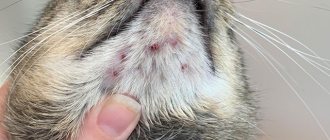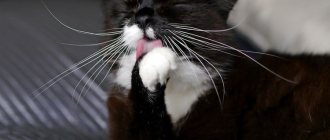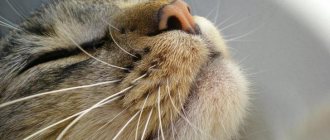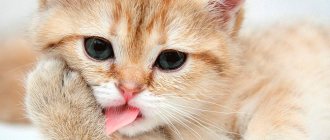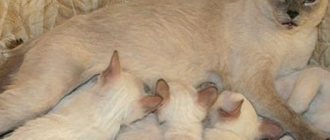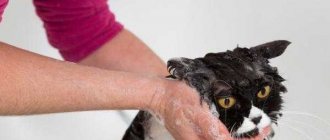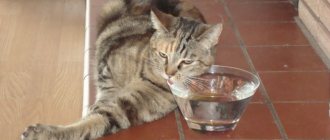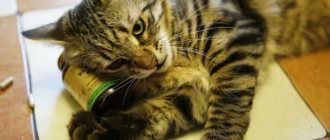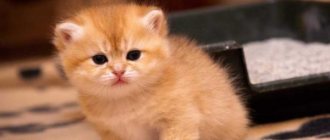(Be the first to vote!)
5589564
06/24/2021 owner reviews
Curious what happens when you trim your cat's whiskers? Find out the role of whiskers in cats and other animals and what happens if they lose them.
Since you are reading this article, you are probably wondering what will happen if you trim or shorten your cat's whiskers. Will this affect the cat's behavior in any way and, most importantly, will it harm the animal? Or are mustaches only for decorative purposes?
To give you a short answer:
Whiskers are not just decorative, and you should never cut or trim the whiskers of a cat or any animal. This will cause discomfort and other problems for the animal.
To get a more detailed answer and learn about the role of whiskers in cats, keep reading.
- What is a mustache?
- The role of whiskers in cats
- What happens after trimming your mustache?
- Does a mustache grow?
- The last word
Why do antennae fall out or break, is this normal?
Even though the structure of a mustache is different from that of regular hair, it can also fall out and break.
Vibrissae have their own lifespan, and after its expiration they leave the follicles. When you see 1-2 fallen antennae, there is no need to sound the alarm, but if there are a lot of them, you need to look for the cause. Often, excessive fragility and loss of whiskers are associated with stress, dehydration or an unbalanced diet that does not provide the animal with the necessary vitamins and minerals, collagen. In this case, the quality of the coat deteriorates, it becomes dull and falls out.
The causes of hair loss can be pathologies that lead to disruption of the hair follicles and their death:
- Fungal diseases. If the lesion covers the area of the whiskers, they begin to fall out along with the hair. The problem area is itchy and itchy.
- Skin diseases, including those of an allergic nature (ringworm, demodicosis, atopic dermatitis). Hair loss and vibrissae provoke inflammation and irritation of the skin.
- Parasites. The condition of the coat and whiskers can worsen both due to helminthic infestation (due to metabolic disorders) and when infected with fleas or ticks, the bites of which force the cat to scratch the skin vigorously.
- Endocrine diseases - diabetes, hypothyroidism (decreased thyroid function). The fur becomes matted, takes on an unkempt appearance and falls out.
- Folliculitis is inflammation of the follicles caused by bacteria, fungi or viruses.
Further care for the animal if its whiskers have been cut off
Do lost whiskers grow back in cats: even after trimming the hairs on the eyebrows and chin, they will be restored in 14-21 days. There are no special means to accelerate their growth - doctors advise using multivitamin complexes specifically designed for animals. They allow hairs to grow faster and become thicker.
Natural recovery will occur provided that no damage to the hair follicle occurred at the time of loss of the mustache. Animal care includes:
- protecting it from hot objects: fireplaces, gas and electric stoves, candles;
- using a special cap will help reduce the risk of head injuries;
- if a pet is placed in a cage for a while, then it will not be able to accidentally harm itself;
- an injured animal should not be allowed out into the street - there it can get under the wheels of a car, fall from a height, crash and damage not only its paws, but also its head.
Each new haircut of the whiskers will cause aggression in the pet towards its tormentor. If there are children in the house, then they immediately need to be explained why there are hard hairs on the cat’s body and what the risk of losing them is.
Trimming whiskers will not make a cat look beautiful; they play a big role in choosing a partner and communicating with familiar and unfamiliar relatives. Having lost their sixth sense organ, animals cannot hunt or move through previously unexplored places. Nature has protected furry pets, but it will take a long time to recover from the loss, during which time they can suffer seriously. Any stressful situation does not pass without a trace, then you should not be surprised at an animal that is aggressively opposed to its own owners.
Beautiful, luxurious whiskers are the pride of any cat, but they are not needed for decoration. It used to be said in villages that the bigger a cat's whiskers, the better it is at catching mice. This statement is partly true, because tufts of long hair, which are commonly called mustaches and eyebrows, really help the animal to hunt, but their function is not limited to this. Why does a cat need a mustache? What are they called scientifically? What happens if you cut them off? Why do my mustaches fall out?
What and why
It’s not for nothing that even in fairy tales it was emphasized: mustachioed and striped. Gorgeous long whiskers are a source of pride for a cat, and often for its owners. Yes, nature gave them for a reason. Let's first look at why a cat needs a mustache. In addition to their decorative function, they are also an organ of smell. They even have a second name, which is rarely mentioned in everyday life.
Causes of acne in animals
It is quite difficult to unequivocally answer the question about the root causes of the painful condition of the skin. However, a list of potential threats that provoke the appearance of acne, especially in the area around the lips and on the chin, helps to find the very provoking factor in a particular case. Veterinarians believe that the causes of such rashes on the skin of cats are:
- low stress resistance of the animal’s body, as a result of which malfunctions of the sebaceous glands occur;
- poor hygiene of this area of the cat’s face (blackheads and blackheads resembling grains form on the chin, since this place is difficult to reach for independent licking);
- concomitant skin diseases that were not treated;
- abnormal functioning of the sebaceous glands and hair follicles;
- weakened immunity (acne in cats often appears when the body’s general defenses are reduced);
- the use of low-quality plastic dishes for feeding cats (the pores of bowls made of such materials collect a huge amount of bacteria, potentially dangerous to the pet’s skin).
What happens if you trim your mustache
The consequences of losses are difficult to predict; they are varied and depend on individual characteristics, whether the cat is a street or domestic cat.
What happens if you cut off a cat's whiskers?
- Pets will begin to look for secluded places and be reluctant to communicate with the owner.
- Street - will have problems finding food, will begin to miss the victim more often, remain hungry until the whiskers manage to grow back.
Navigation disorders are the answer to the question of what will happen if cats' whiskers are trimmed. For some time, the animal will lose the ability to easily navigate the space around it.
- inability to walk in a straight line;
- frequent falls;
- collision with furniture;
- various injuries.
Failure in behavior is associated with the absence of habitual signals about obstacles and health hazards. Such deviations are not typical for everyone. In most cases, the problem manifests itself as difficulty in jumping, free orientation in the dark, or in unfamiliar surroundings.
Vibrissae help cats maintain perfect balance
Experienced breeders report the following deviations in the behavior of young animals and adult pets, which will happen if you cut off a cat’s whiskers:
- inappropriate behavior based on stress and fearfulness;
- lack of contact, withdrawal into oneself;
- lack of physical activity;
- increasing the amount of sleep.
Important! Comfortable conditions for a cat that has lost its whiskers will provide an opportunity to reduce the risk of injury, but will not ensure its peace of mind
Will they grow back?
During scientific research, parts of the test animals had their whiskers removed completely or partially. Behavioral studies have shown that pets are more likely to get stuck in narrow holes, miss them, and be unable to get into them. Such failures had a bad effect on the psyche, the cats began to be afraid and hide, giving up any attempts.
You should not conduct your own experiments on a cat and trim its whiskers. It will take her a long time to grow them, and all household members will have to endure outbursts of aggression and other unpleasant reactions from a mentally unstable psyche.
Inappropriate behavior is the result of loss of vibrissae
Do cats grow whiskers?
Recovery will take some time. Their growth rate is three times faster than fur regrowth. Despite this, veterinarians warn that cutting the whiskers means losing the organs of vision.
How does the loss of a whisker affect the health and behavior of a pet?
The most common are a sharp loss of the ability to move normally, navigate in the dark and in space, adequately assess the size of objects, the distances to them and between them. The accuracy of jumps and adaptability to new environments also decrease. The cat’s overall activity decreases, he becomes less playful, withdrawn, and sometimes even aggressively fearful. You need to give your pet time to get used to the new circumstances and wait until the mustache grows back. If the whiskers do not recover after a month, then it is better to seek help from a veterinarian.
Preventative measures to prevent mustache loss
When a cat's whiskers fall out, why this happened is the first thing that should interest the owner who loves his four-legged friend. He must do everything to prevent the loss of one of the main elements of the cat's body. Firstly, at the first manifestations of hair loss, you need to find out the cause and carry out the correct treatment. A veterinarian's examination and prescription will help with this. Preventive measures against vibris loss consist of the following:
- regular treatment of the animal for helminths and parasites;
- development of a suitable diet, including vitamins and microelements;
- eliminating possible allergens from the cat’s life;
- timely vaccination against diseases and infections;
- preventive visits to the veterinary clinic;
- keeping the animal and its habitat clean;
- carrying out hygiene procedures as necessary using suitable detergents;
- excluding self-medication.
Timely vaccination against diseases and infections
If you follow all the rules and make sure that the animal is not in conditions that are dangerous for it, you can minimize whisker loss. Remember that under no circumstances should a cat's whiskers be trimmed unless medically required. Also stop the habit of pulling your pet's whiskers, this causes him great discomfort.
Experiments with mustache removal
For the sake of science, scientists were forced to conduct experiments to remove vibrissae. Thus, some cats completely lost control of their behavior. There were situations when the animal could not understand that it was necessary to climb into the hole; it simply got stuck in it. This indicates that with the loss of the whiskers, the ability to evaluate the surrounding space is partially or completely lost. Also, cats whose whiskers were trimmed developed problems with gait, often fell and, when jumping, could not correctly calculate the distance to the target, and therefore simply crashed into it.
Why does a cat need a mustache?
A kitten without a whisker loses orientation in space
Vibrissae are the sixth sense organ directly connected to the brain. With their help, life is regulated: from touch to communication with furry fellows. If you don’t know why cats absolutely cannot have their whiskers cut, you can seriously harm them. Whiskers are not ordinary fur, and their loss deprives the pet of the opportunity to safely walk down the street, explore unfamiliar types of food, or hunt.
A kitten without whiskers loses orientation in space Vibrissae are multifunctional devices designed by nature as an additional sensory organ. They help cats hunt. A running mouse creates air vibrations that are instantly picked up by a small predator. The pet determines:
- the exact location of your victim;
- her condition;
- the point to which the enemy moves.
After capturing the mouse, the hairs growing on the cat's front paws come to the rescue. With their help, she controls the behavior of the victim, assesses the situation, determines the location and strength of resistance of the rodent or bird.
When communicating with fellow creatures, the mustache plays a big role. An animal’s reaction to the appearance of an unfamiliar individual or person can be determined by the position of its whiskers:
- If they are aimed at the subject of study, then the pet is interested in communication, it emanates friendliness.
- If they are pressed together with the ears, then attempts to pet the cat will lead to scratches, bites and the rapid disappearance of an aggressive animal.
Important! Vibrissae are the first to form during the embryonic development of babies. They help the newborn quickly establish contact with the outside world, identify the mother and brothers
It’s better not to even think about what will happen if a newborn cat’s whiskers are trimmed. You should not do this, because until they are restored the baby will be deaf and blind and will be afraid to move.
Difference from hairs
The physiological characteristics of vibrissae include their deep insertion into the skin. Each of the antennae is a kind of antenna, surrounded by many nerve endings. They are used to transmit received signals to the brain center.
Vibrissae are complex receptors equipped with muscle fibers. They are responsible for the sense of touch, and their appearance is associated with evolutionary changes in the furry pet’s body. The longest ones are located on top, the shortest ones are located in the chin area. The main help of sensitive antennas is the ability to quickly and silently hunt birds and rodents at night.
Whiskers help cats hunt
Important! By the whiskers you can evaluate the cat's next action. Splayed - intended to intimidate the enemy, directed in the opposite direction - indicate anxiety and uncertainty of the pet
Sensitivity
Resourcefulness and cunning are important character traits not only of an adult, but also of a small kitten. If you cut a cat's whiskers, what will happen to it:
- sensitivity to possible danger will decrease;
- the definition of the road will be lost in complete darkness;
- the reaction to environmental changes will disappear.
Touch is one of the important functions of vibrissae. With its help, pets will find out the safety of the food offered and its freshness. In pitch darkness, the animal easily avoids objects standing in the way by touching them with its whiskers. In some cases, direct contact is not necessary: due to the mobility and vibration of hard hairs, air vibrations are created, the reflection of which from foreign objects is caught by the vibrissae. After transmitting the signal to the brain center, the cat receives a three-dimensional image of space.
If a cat's whiskers are cut off, what will happen to it during a chase:
- she will not be able to determine the diameter of the hole she is going to crawl into;
- may get stuck in it;
- she will not be able to hide from her pursuer.
Important! Veterinarians have noticed that the loss of sensitive hairs for various reasons leads to the development of neuropsychiatric disorders in furry pets. They lose the skills to receive and process information, become defenseless, and behave inappropriately
Differences from animal hairs
There are physiological characteristics.
The vibrissae are planted very deep into the skin; these are not ordinary hairs at all. Each whisker is an antenna that is surrounded by nerve cells. This is necessary to transmit signals directly to the brain center. But that is not all. Vibrissae are equipped with muscle fibers. That is, it is not hair at all, but rather complex receptors. In fact, they are responsible for the sense of smell, they just changed during evolution. The longest and most sensitive mustaches are located on top, shorter ones can be seen in the chin area. Remember that cats hunt at night, they need to quickly and silently find and catch a rodent. It is thanks to the whiskers that a cat can feel an object without contacting it and avoid colliding with an obstacle. What happens if you cut a cat's whiskers? He will lose a huge flow of information. Of course, this is not fatal at home, but it affects the well-being of the pet.
A cat's whiskers are falling out - causes of loss
There are several reasons why a cat's whiskers fall out. If an animal behaves strangely, bumps into objects or shows anxiety, and the owner notices fallen or broken whiskers, the cause may be a pathological process developing in the body. The most common causes of whisker loss in cats are:
- Acute deficiency of vitamins and minerals in the body. Loss or increased fragility of the vibrissae occurs as a result of a lack of vitamins, especially fat-soluble ones - retinol and ergocalciferol. Fragility may also be caused by a lack of collagen in your pet's diet. In addition to the fragility of the whiskers, there are disturbances in the structure of the coat (dullness, loss), the nails become exfoliated, and an unpleasant, repulsive odor can be heard from the oral cavity. The occurrence of such symptoms requires consultation with a veterinarian and diagnostic measures. It may be enough for your pet to adjust its diet by adding vitamin and mineral complexes to its main food.
- Thyroid gland dysfunction. Problems in the endocrine system always negatively affect the functioning of the entire body. One of these pathologies is hypothyroidism. This is a pathological process caused by decreased activity of the thyroid gland. Most often diagnosed in elderly pets due to a general slowdown in the body's metabolic processes. With hypothyroidism, the animal’s whiskers not only fall out, but seem to crumble. The coat also undergoes changes, the animal shows anxiety, appetite increases, and polydipsia (increased thirst) occurs. The pet may suffer from anorexia. Hypothyroidism can be characterized by dyspeptic disorders - eruption of gastric contents, profuse diarrhea. Self-medication in case of hypothyroidism can cause death of the animal, so it is recommended to consult a qualified doctor. This will allow us to assess the degree of neglect of the pathology, as well as develop an adequate treatment regimen.
- Pathologies of the skin. Skin diseases that arise as a result of fungal pathologies or the activity of pathogenic bacterial microflora, especially in the area of the pet's face, also provoke whisker breakage. Vibrissae can fall out in a cat if it is affected by notoedrosis or microsporia. This is due to the fact that the cat’s whisker follicle is located deeper than the hair follicle. In addition to the loss of whiskers due to a fungal or bacterial skin infection, symptoms such as itching and restlessness are observed. As a result of scratching the skin, wound surfaces are formed.
- Food allergic reaction. A food allergy in a cat provokes disruption of the internal organs. The skin and coat are primarily affected. Whiskers and hair fall out in the head area, with further scratching and the formation of crusts. It is necessary to eliminate the factor that provokes the allergy. A veterinary specialist will help carry out differential diagnosis and give recommendations for treatment.
- Injuries resulting from fights with relatives. Domestic cats constantly defend territorial boundaries. Therefore, fights between relatives occur quite often. In order to cause inconvenience to its opponent and show its superiority, the cat rips out the enemy's whiskers by the roots or bites them. If fights occur between two cats living in the same house, it is recommended to separate them, carefully monitoring the fights. Pets that do not have breeding value are recommended to be neutered.
There are a number of other pathologies that provoke increased fragility of the mustache. Thus, disturbances in the functioning of the immune or endocrine system lead to serious consequences. Loss of whiskers or their fragility is just one of many symptoms.
Why hairs fall out
If it’s not just another change of hard hairs, then why does a cat’s whiskers fall out? This is a question that inexperienced owners often ask online.
Loss of whiskers occurs due to disorders in the animal’s body, so it is important to recognize the symptoms in time and take action. We suggest you read: How to teach a cat commands: give a paw, bring a toy, walk on its hind legs || We teach a cat to follow 8 commands, little secrets and tricks. We suggest you read: How to teach a cat commands: give a paw, bring a toy, walk on its hind legs || We teach a cat to follow 8 commands - little secrets and tricks
We suggest you read: How to teach a cat commands: give a paw, bring a toy, walk on its hind legs || We teach a cat to follow 8 commands - little secrets and tricks
Hypothyroidism usually occurs in older cats. This disease affects all body systems and leads to increased metabolism. In addition to the loss of the mustache, other signs are observed:
- wool properties deteriorate;
- the animal is hyperactive and noticeably nervous;
- appetite increases with weight loss;
- the pet experiences increased thirst, which it constantly strives to satisfy;
- sometimes diarrhea and vomiting occur.
The roots of the whiskers, compared to the roots of the fur, are located quite deep in the skin. They are surrounded on all sides by nerves, blood vessels and sensitive muscles. The development of a bacterial skin infection or the proliferation of parasites in the facial part of the head often explains why a cat's whiskers fall out. Such pathologies, accompanied by unbearable itching, are easily identified during an initial examination of the skin.
These disturbances in the hormonal system lead to changes in metabolism. Diabetes mellitus in middle-aged and elderly cats is usually indicated by such signs as increased thirst and frequent urination, excessive appetite against the background of general exhaustion of the body. The pet needs immediate help, otherwise the patient’s condition will worsen, and the loss of the antennae, compared to other problems, will no longer be noticeable.
The cat's body, like the human body, can react completely unexpectedly to some foods. Loss of whiskers and fur, accompanied by itching, redness of the mucous membranes, profuse salivation and discharge from the eyes - a condition caused by an allergic reaction.
Non-food allergies can be triggered by a variety of chemicals, certain types of plants and other objects that appear in a cat's environment. It is sometimes very difficult to determine what exactly caused the rebellion in the body; you have to use the method of elimination. The course of treatment will require the use of antihistamines.
In any case, you don’t need to think long about why your cat’s whiskers are falling out - a veterinary clinic specialist will explain in detail what to do in this situation.
What happens if you trim your mustache
The consequences of losses are difficult to predict; they are varied and depend on individual characteristics, whether the cat is a street or domestic cat.
What happens if you cut off a cat's whiskers?
- Pets will begin to look for secluded places and be reluctant to communicate with the owner.
- Street - will have problems finding food, will begin to miss the victim more often, remain hungry until the whiskers manage to grow back.
Navigation disorders are the answer to the question of what will happen if cats' whiskers are trimmed. For some time, the animal will lose the ability to easily navigate the space around it.
- inability to walk in a straight line;
- frequent falls;
- collision with furniture;
- various injuries.
Failure in behavior is associated with the absence of habitual signals about obstacles and health hazards. Such deviations are not typical for everyone. In most cases, the problem manifests itself as difficulty in jumping, free orientation in the dark, or in unfamiliar surroundings.
Vibrissae help cats maintain perfect balance
Experienced breeders report the following deviations in the behavior of young animals and adult pets, which will happen if you cut off a cat’s whiskers:
- inappropriate behavior based on stress and fearfulness;
- lack of contact, withdrawal into oneself;
- lack of physical activity;
- increasing the amount of sleep.
Important! Comfortable conditions for a cat that has lost its whiskers will provide an opportunity to reduce the risk of injury, but will not ensure its peace of mind
Will they grow back?
During scientific research, parts of the test animals had their whiskers removed completely or partially. Behavioral studies have shown that pets are more likely to get stuck in narrow holes, miss them, and be unable to get into them. Such failures had a bad effect on the psyche, the cats began to be afraid and hide, giving up any attempts.
You should not conduct your own experiments on a cat and trim its whiskers. It will take her a long time to grow them, and all household members will have to endure outbursts of aggression and other unpleasant reactions from a mentally unstable psyche.
Inappropriate behavior is the result of loss of vibrissae
Do cats grow whiskers?
Recovery will take some time. Their growth rate is three times faster than fur regrowth. Despite this, veterinarians warn that cutting the whiskers means losing the organs of vision.
Functions of vibrissae
The purpose of the mustache is to be a kind of radar, an organ of touch. The longest, hardest and most sensitive ones are located above the upper lip, shorter and less sensitive ones are on the chin, under the eyes, all over the body, on the ankles, pads of the paws and even on the tail.
An adult cat has 12 hairs on each side of its cheeks. The average hair length is 6 centimeters. It is noteworthy that the cat's longest whiskers come from Finland. For this feature, it is even included in the Guinness Book of Records. The length of its whiskers is 19 cm.
The vibrissae give the cat the opportunity to explore the world around them and at the same time protect it from danger and are responsible for maintaining balance. It is thanks to their whiskers that cats are excellent hunters and can navigate in the dark without any problems. With their help, animals examine food for taste and freshness.
In addition, they are an indicator of mood - an angry cat tries to press the whiskers as close to the muzzle as possible, while in a good-natured animal the whiskers are directed forward. It is not surprising that many pet owners are concerned about this question: what will happen if a cat’s whiskers are cut off?
How to help an animal that has lost its whiskers
Regular whisker loss in cats without an identified cause requires additional examination by a veterinarian. After receiving the results, appropriate treatment methods can be carried out:
- taking anthelmintic and antiparasitic drugs for therapeutic and preventive purposes;
- antihistamines to eliminate allergies and antibiotics to treat infectious diseases;
- vitamins, minerals to strengthen and restore immunity.
Creating favorable living conditions for your pet:
- eliminating excessive dryness in the room when using a humidifier;
- ensuring that bathing is not too frequent and using special shampoos;
- the use of fatty acids (biotin, taurine) in compliance with the dosages prescribed by the veterinarian, since an excess amount of drugs can have the opposite effect;
- eliminating stress factors for your pet;
- use of high-quality animal feed;
- ensuring water balance (regular fluid intake by the cat throughout the day).
Recommendations for eliminating this problem if your cat’s whiskers fall out for various reasons:
- using cheap food for the animal, since such products are of poor quality and can negatively affect the general condition of the pet;
- regular treatment of the coat against parasites, fleas and ticks;
- processing raw meat to destroy helminth eggs that may be contained in it;
- excluding aggression towards the cat from other family members (young children);
- addition of various vitamin complexes to the daily diet of cats;
- regularly providing the required amount of drinking water for the animal, since its lack contributes to the development of urolithiasis and other problems;
- visit the veterinarian at least 2 times a year to assess the general condition of the pet;
- excluding the trimming of whiskers in cats, since even a slight shortening of the length can cause the development of negative consequences.
Whiskers for cats are one of the important organs that provide touch, so their damage becomes the cause of many disorders in the body. Vibrissae require careful care and control on the part of the pet owner to maintain the good condition of the animal.
What happens if you trim your mustache
The consequences of losses are difficult to predict; they are varied and depend on individual characteristics, whether the cat is a street or domestic cat.
What happens if you cut off a cat's whiskers?
- Pets will begin to look for secluded places and be reluctant to communicate with the owner.
- Street - will have problems finding food, will begin to miss the victim more often, remain hungry until the whiskers manage to grow back.
Navigation disorders are the answer to the question of what will happen if cats' whiskers are trimmed. For some time, the animal will lose the ability to easily navigate the space around it.
The problem appears:
- inability to walk in a straight line;
- frequent falls;
- collision with furniture;
- various injuries.
Failure in behavior is associated with the absence of habitual signals about obstacles and health hazards. Such deviations are not typical for everyone. In most cases, the problem manifests itself as difficulty in jumping, free orientation in the dark, or in unfamiliar surroundings.
Vibrissae help cats maintain perfect balance
Experienced breeders report the following deviations in the behavior of young animals and adult pets, which will happen if you cut off a cat’s whiskers:
- inappropriate behavior based on stress and fearfulness;
- lack of contact, withdrawal into oneself;
- lack of physical activity;
- increasing the amount of sleep.
Important! Comfortable conditions for a cat that has lost its whiskers will provide an opportunity to reduce the risk of injury, but will not ensure its peace of mind
Will they grow back?
During scientific research, parts of the test animals had their whiskers removed completely or partially. Behavioral studies have shown that pets are more likely to get stuck in narrow holes, miss them, and be unable to get into them. Such failures had a bad effect on the psyche, the cats began to be afraid and hide, giving up any attempts.
You should not conduct your own experiments on a cat and trim its whiskers. It will take her a long time to grow them, and all household members will have to endure outbursts of aggression and other unpleasant reactions from a mentally unstable psyche.
Inappropriate behavior is the result of loss of vibrissae
Do cats grow whiskers?
Recovery will take some time. Their growth rate is three times faster than fur regrowth. Despite this, veterinarians warn that cutting the whiskers means losing the organs of vision.
What does the absence of a mustache lead to?
The loss of a cat's whiskers directly affects not only its mood, but also its behavior and life in general. As mentioned earlier, the whiskers in cats are directly connected to the nerve endings, and this has a certain impact on the character of the cat that is forced to live without a whisker.
With the absence of whiskers, cats, of course, do not die, but, nevertheless, they are deprived of an important sensory organ. Many actions, such as hunting, navigation, movement, become much more difficult to perform. In this regard, when a cat loses its whiskers, it becomes lost, nervous, and aggressive. Until the whiskers grow back (this is a rather long process), she is in constant stress, and this is very harmful to the health of the animal. So, cats without whiskers have a very difficult life psychologically.
© shutterstock
Why do cats lose their whiskers?
When a cat sheds, she may also sometimes lose a couple of whiskers.
Cats typically have 8-12 whiskers on each cheek. Don't worry if you notice that your pet is losing its fur and a few whiskers. This is completely normal.
There are, however, some other factors that may also explain why your cat is left without a whisker. If your pet has other symptoms, such as ulcers, spots on the skin, and increased skin sensitivity, the cat is sick.
Here are some more serious reasons why an animal may lose its whiskers:
- fight with another animal;
- ticks on cats;
- hair loss;
- feline dermatitis;
- hypothyroidism (disorders of the thyroid gland).
If you think there is a serious cause, you should consult your veterinarian as soon as possible.
Interesting facts about mustaches
- The system of pressure on the antennae can create a feeling of anxiety in them, so use a wide plate or flat feeder to eat.
- In addition to a dozen hairs that are located on different sides of the nose, there are rather short analogues that are located near the eyes, near the chin, and on the other side of the paws in front.
- The size of the hairs is such that they are literally similar to the width of the body, so they can figure out the width of the holes for themselves without even trying to pass through it.
- The placement of the mustache can be balanced by different moods. If they are completely relaxed and straightened in different directions, then the cat feels calm. If they are turned forward, it means there is anxiety.
- Without whiskers, cats may become disoriented and experience headaches, thereby not receiving vital signals.
Further care for the animal if its whiskers have been cut off
Do lost whiskers grow back in cats: even after trimming the hairs on the eyebrows and chin, they will be restored in 14-21 days. There are no special means to accelerate their growth - doctors advise using multivitamin complexes specifically designed for animals. They allow hairs to grow faster and become thicker.
Natural recovery will occur provided that no damage to the hair follicle occurred at the time of loss of the mustache. Animal care includes:
- protecting it from hot objects: fireplaces, gas and electric stoves, candles;
- using a special cap will help reduce the risk of head injuries;
- if a pet is placed in a cage for a while, then it will not be able to accidentally harm itself;
- an injured animal should not be allowed out into the street - there it can get under the wheels of a car, fall from a height, crash and damage not only its paws, but also its head.
Each new haircut of the whiskers will cause aggression in the pet towards its tormentor. If there are children in the house, then they immediately need to be explained why there are hard hairs on the cat’s body and what the risk of losing them is.
Trimming whiskers will not make a cat look beautiful; they play a big role in choosing a partner and communicating with familiar and unfamiliar relatives. Having lost their sixth sense organ, animals cannot hunt or move through previously unexplored places. Nature has protected furry pets, but it will take a long time to recover from the loss, during which time they can suffer seriously. Any stressful situation does not pass without a trace, then you should not be surprised at an animal that is aggressively opposed to its own owners.
Why does a cat need a mustache? This question can be asked by a child to his parents or by people who have taken a furry animal into their home for the first time and would like to find out themselves. It would seem that whiskers are longer hairs on the animal’s face. However, everything is not as simple as it seems.
What are whiskers needed for, and how does a cat use them?
Why do cats need whiskers? With their mustaches and eyebrows they “feel” the nearby space, receiving additional information about it. Vibrissae allow a small predator to:
- Determine the distance to objects and their size. For example, with their help, a cat, approaching a hole, can correlate its size with the width of its own body and decide whether it should try to get inside.
- Orientate yourself in space even in the dark. By analyzing information from the vibrissae and other sense organs, the brain creates the most complete picture of the surrounding world. In the dark, cats see better than people, but the main helpers in conditions of limited visibility are not their eyes, but their whiskers.
- Get to know something new. To obtain information about an object, another animal or person, the cat approaches it, directing its whiskers forward.
- Determine external conditions (atmospheric pressure, humidity, temperature) and sense their slightest changes. When the cat does this, the whiskers move slightly. It has been noticed that before natural disasters or weather changes, the behavior of animals changes.
- Avoid eye damage. The cat is able to make his way through thorny thickets even in the dark - touching the branches with his whiskers, he automatically closes his eyelids.
- Assess the speed and direction of the wind in order to correctly choose the strength and trajectory of the jump.
- Get information about food. Everything that is near the muzzle does not fall into the animal’s field of vision. The nose and whiskers help the cat determine what is in front of it.
- Monitor the condition of the prey that is in the teeth.
- Determine the structure and temperature of the surface. The vibrissae located on the paws are responsible for this.
Vibrissae are an indicator of the animal's mood. The whiskers are directed forward - it shows interest and is ready for active action. If they are pressed to the face, the cat is scared or aggressive.
